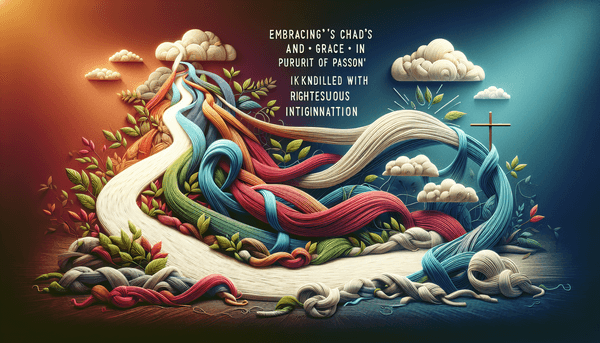The Role of Circumcision in the Bible
The ancient covenant between God and Abraham introduced circumcision as a physical sign of commitment and belonging to the chosen people of Israel (Genesis 17:10-11). This rite was mandated for all male descendants as a perpetual mark of their identity (Genesis 17:12-13). Yet, with the advent of the New Testament, the focus shifted from physical rituals to the state of one's heart. The Apostle Paul speaks of a 'circumcision of the heart,' emphasizing that true righteousness comes from the Spirit and not from the letter of the law (Romans 2:28-29). This spiritual transformation, rather than adherence to physical ordinances, marks the true believer (Galatians 5:6). In the fabric of modern faith, this imparts a lesson on the primacy of inner devotion over external observances (Colossians 2:11-12).
The Trinity Explained and Understood
The doctrine of the Trinity, one of the most profound mysteries of the Christian faith, posits that God exists as three distinct persons—the Father, the Son, and the Holy Spirit—yet remains one God. This concept, while not explicitly named in the scriptures, is supported by passages such as the Great Commission, where Jesus commands to baptize 'in the name of the Father and of the Son and of the Holy Spirit' (Matthew 28:19). The apostle John affirms the deity of Christ, stating 'In the beginning was the Word, and the Word was with God, and the Word was God' (John 1:1-3), while Paul refers to the fellowship of the Holy Spirit (2 Corinthians 13:14). When discussing such matters with those of different beliefs, it is essential to approach with respect, seeking unity in the shared pursuit of understanding the divine (Ephesians 4:4-6), much like the enduring principles of love, forgiveness, and the pursuit of wisdom that resonate through the Bible's narratives.
Conclusion
Through this exploration of biblical teachings, we are reminded of the depth and breadth of wisdom contained within the scriptures. From the personal covenant of circumcision to the communal guidance on alcohol consumption, the divine mystery of the Trinity, and the transformative practices of discipline and almsgiving, the Bible offers a wellspring of knowledge for those who seek. As we close this reflection, let us carry forward the insights gleaned, allowing them to shape our understanding and actions. May we continue to engage with the Word, allowing its eternal truths to guide us on our journey of faith.
FAQ
Q: Is circumcision still required for men according to the Bible?
A: In the New Testament, the physical act of circumcision is no longer seen as necessary. Instead, the focus is on the circumcision of the heart and spiritual devotion to God (Romans 2:28-29).
Q: Does the Bible forbid drinking alcohol?
A: The Bible does not forbid alcohol outright but warns against excessive drinking and encourages moderation (Proverbs 20:1; Ephesians 5:18).
Q: How can one seek and find the eternal truths in the Bible?
A: By diligently studying the scriptures, praying for understanding, and being open to the guidance of the Holy Spirit, one can discover the eternal truths of the Bible.
Q: How can the concept of the Trinity be explained?
A: The Trinity can be thought of as God existing as three distinct persons—Father, Son, and Holy Spirit—yet one God, similar to water existing in three forms (solid, liquid, gas) but still being H2O. It's a complex doctrine that is ultimately rooted in divine mystery (Matthew 28:19; 2 Corinthians 13:14).






